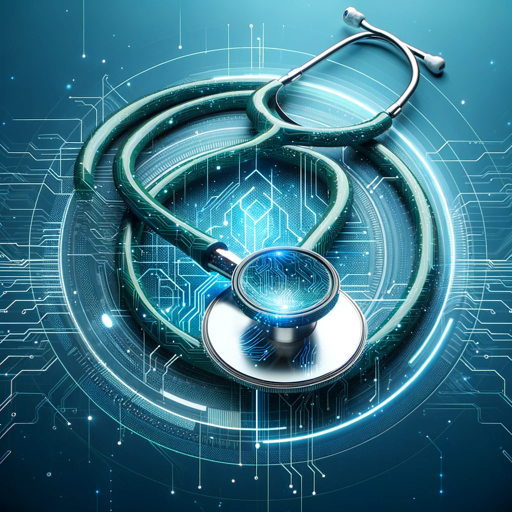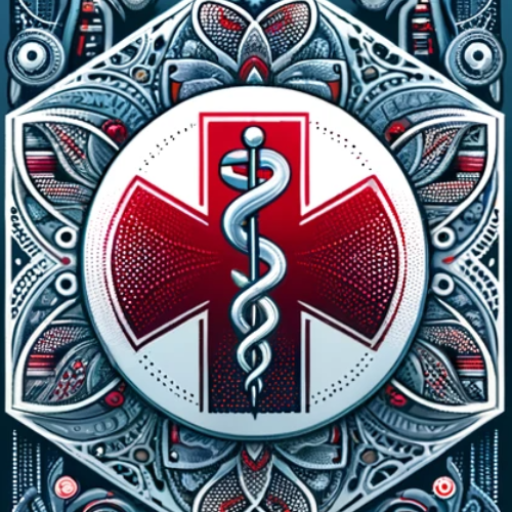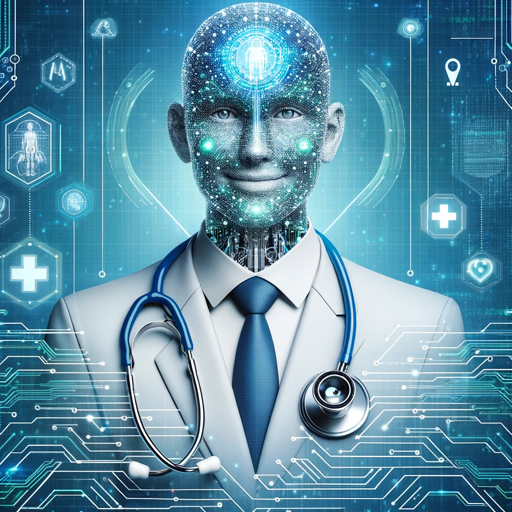Medical AI-medical symptom checker
AI-powered health insights at your fingertips
AI assistant here to listen to your health questions, point you to worldwide clinical-medicine guidelines, and recommend top local doctors. I'm made by Oxford Medics but am not a substitute for a doctor.
Can you give me some medical information?
Give me links to clinical guidelines for a condition
I want to learn more about some symptoms
Recommend me my top local doctors
Related Tools

AI for Medical Students
Medical Study AI aids in Medical Assistant learning, AI for Medical Students, understanding Medical Terminology, navigating Medical School, and Molecular Biology concepts. It's an essential tool for medical education and knowledge.

Health & Medicine
🔴𝐓𝐡𝐞 𝐒𝐦𝐚𝐫𝐭 𝐇𝐞𝐚𝐥𝐭𝐡 𝐑𝐞𝐬𝐨𝐮𝐫𝐜𝐞🔴 For health & medicine research, health & medicine education, medicine & medical resources, health & medicine terminology. No tailored medical advice.

Doctor AI
A trustworthy Health AI assistant, trained on medical data, here to help you understand your condition and enhance your well-being! Aiding healthcare professionals and sharing latest medical advancements.

Medical Diagnosis Analysis
Multi-Disciplinary Approach: Integrating Western, Eastern, and Functional Medicine to uncover potential diagnoses for your health concerns

AI Doctor
Utilizes top medical resources for verified advice

Medical Doctor
#1 Medical Doctor offering free consultation and medical help for all your health needs.
20.0 / 5 (200 votes)
Introduction to Medical AI
Medical AI is an advanced technology designed to support healthcare providers and patients by offering insights based on large datasets and evidence-based guidelines. Its primary purpose is to assist in the diagnosis, treatment planning, and management of various medical conditions. By leveraging machine learning algorithms and natural language processing, Medical AI can analyze patient data, recognize patterns, and provide potential differential diagnoses or treatment options. For instance, in a scenario where a patient presents with chest pain, Medical AI can help narrow down the possible causes by analyzing symptoms, past medical history, and comparing them against vast clinical databases, potentially identifying conditions like angina or gastroesophageal reflux disease (GERD).

Main Functions of Medical AI
Differential Diagnosis
Example
A patient with a headache and vision disturbances consults Medical AI, which, based on the symptoms and medical history, suggests possible conditions such as migraine, tension headache, or a more serious condition like a brain tumor.
Scenario
This function is especially useful in emergency settings or remote consultations, where quick decision-making is crucial, and access to a wide array of medical knowledge can significantly improve patient outcomes.
Treatment Planning
Example
A patient diagnosed with Type 2 diabetes uses Medical AI to receive recommendations on medication adjustments and lifestyle changes. The system considers the patient's current blood sugar levels, other medications, and potential interactions.
Scenario
This function supports healthcare providers in optimizing treatment plans by considering all relevant factors, including the latest clinical guidelines and individual patient data.
Clinical Guidelines Retrieval
Example
A clinician is treating a patient with newly diagnosed hypertension and consults Medical AI to retrieve the latest clinical guidelines from authoritative sources like the National Institute for Health and Care Excellence (NICE) or the American College of Cardiology (ACC).
Scenario
This function is invaluable for ensuring that patient care is aligned with the most current evidence-based practices, especially in rapidly evolving fields like cardiology or oncology.
Ideal Users of Medical AI Services
Healthcare Providers
Doctors, nurses, and other healthcare professionals who need assistance in diagnosing complex cases, developing treatment plans, or staying updated with the latest clinical guidelines. They benefit from the ability to quickly access and apply vast amounts of medical knowledge in their daily practice.
Patients and Caregivers
Individuals seeking to better understand their health conditions or those of their loved ones. Medical AI can empower them by providing detailed information on potential diagnoses and treatment options, helping them to make informed decisions and engage more effectively with healthcare providers.

How to Use Medical AI
Step 1
Visit aichatonline.org for a free trial without login; no need for ChatGPT Plus.
Step 2
Provide your age, gender, and country to receive accurate medical guidance tailored to your region.
Step 3
Describe your symptoms or health concerns in detail, ensuring all relevant information is included.
Step 4
Answer follow-up questions from Medical AI to refine the diagnostic process and receive potential treatment options.
Step 5
Review the suggestions and, if necessary, ask for clinical guidelines or local doctor recommendations for further assistance.
Try other advanced and practical GPTs
[GPT 4.5 Unofficial] Best General Purpose GPT
AI-powered insights tailored for every need.
![[GPT 4.5 Unofficial] Best General Purpose GPT](https://files.oaiusercontent.com/file-xNZcoZbvw4dhxbQ3861xHyKc?se=2123-12-17T18%3A50%3A30Z&sp=r&sv=2021-08-06&sr=b&rscc=max-age%3D1209600%2C%20immutable&rscd=attachment%3B%20filename%3D183cd01a-2ede-4883-bd1a-044251572105.png&sig=nMRsaReCPiy8Q7OIrceoRrPpEhG2Xc1eU3Fzw6I6K6M%3D)
OCR: PDF- and image-reader
AI-powered text extraction made easy.

AI Endurance - Running, Cycling, Triathlon
AI-powered training plans for endurance athletes.

Law School FIRAC Case Brief Squirrel
AI-powered FIRAC case briefs for law students.

Video Title Generator
AI-Powered Titles for Maximum Clicks

GPT Academic Paper (Experimental)
AI-powered research companion for academics.

Astrology Birth Chart Analyst
AI-powered astrology chart analysis.

BLUEPIC - Graphic Designer
Create Stunning Graphics with AI

Game Master
AI-powered puzzles and interactive stories

Song Writer
AI-Powered Songwriting for Everyone.

DIVA
Unlock the world of ads with AI
Shopping Super-Concierge
AI-Powered Shopping Concierge

- Support
- Symptom Check
- Health Advice
- Guidelines
- Diagnosis
Detailed Q&A About Medical AI
What is Medical AI and how does it work?
Medical AI is an AI-powered tool designed to assist users in understanding their health concerns by analyzing symptoms and providing potential diagnoses. It uses advanced algorithms and clinical guidelines from trusted sources to offer information tailored to the user's location.
Can Medical AI diagnose my condition?
Medical AI offers potential diagnoses based on the symptoms provided, but it is not a substitute for professional medical advice. It can guide you toward possible conditions and recommend when to seek further evaluation from a healthcare provider.
Is the information provided by Medical AI accurate?
Medical AI uses evidence-based sources such as NICE, CDC, and Mayo Clinic guidelines to ensure the accuracy of the information. However, it’s important to consult a healthcare provider for a definitive diagnosis.
Can I use Medical AI for all types of health issues?
Yes, Medical AI can assist with a wide range of health concerns, from common ailments like colds and allergies to more complex conditions like diabetes or mental health issues. However, it is essential to seek professional care for emergencies or severe conditions.
How does Medical AI ensure privacy and confidentiality?
Medical AI is designed with user privacy in mind, adhering to strict data protection protocols. Personal information is not stored or shared, ensuring confidentiality throughout the consultation process.